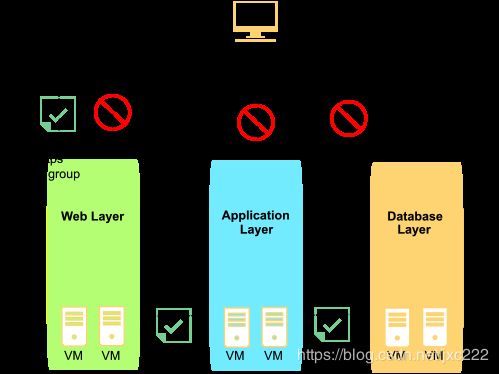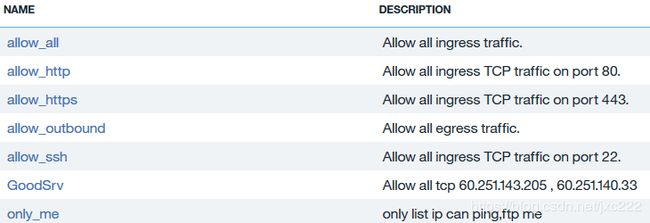IBM Cloud 2015 - Network - Security Group
| 分类 |
L2 |
描述 |
|
|
介绍 |
网络IP安全有黑名单,白名单2种方式, 黑名单 -依赖Guest OS的机制,例如 linux iptable configure 白名单 -依赖云管理平台CMP的机制, 例如 Security Group
|
| Security Group |
doc |
Secruity group 新功能,不在SL旧文档库,在 bluemix新文档库 https://console.bluemix.net/docs/infrastructure/security-groups/sg_overview.html#about-security-groups 屏幕左侧sg章节覆盖了定义,日常操作
|
|
|
Purpose & summary |
在云平台层面,对机器的IP进行 on/off block。 传统方式是用机器OS内的iptable, firewall配置 Sg的配置 包括N个rule, 每个rule, 指定inbound/outbound, protocol, ip range. 多个Device 通过关联到sg上面,继承sg上面的rule, 达到效果 举例:把device 01 关联到对应sg上面,实现port control 关联到Allow_all 是能够全部访问 不关联到 allow_all 是不能访问内外网 关联到Allow_tcp_80 是只能访问80端口 关联到only_me 是只能被only_me里面IP机器访问,其他IP机器无法访问。
Doc 里面出现的一个示意图 Rule - App Dev 只能443访问 web layer device - App Dev 不能访问 App Layer, DB layer - only Web Layer 能访问 App Layer -only App Layer 能访问 DB layer
Demo: Step-by-step: Adding a pre-defined Security Group during ordering (写的太空泛,不如看下面sg例子来理解) https://console.bluemix.net/docs/infrastructure/security-groups/add-existing-sg.html#step-by-step-adding-a-pre-defined-security-group-during-ordering
|
|
|
系统默认* |
系统默认提供的sg, account based, 不要删除,可以不关联机器。 下图5个sg是系统默认的, 下面2个是用户自建的
sg= allow_all, 有2条rule, inbound, IPV4, all, CIDR, 0.0.0.0/0 inbound, IPV6, all, CIDR, 0.0.0.0/0 Assign device = 默认把所有机器关联进来
Sg= allow_http inbound, IPV4, TCP, 80-80, CIDR, 0.0.0.0/0 inbound, IPV6, TCP, 80-80, CIDR, 0.0.0.0/0
Sg= allow_https inbound, IPV4, TCP, 443-443, CIDR, 0.0.0.0/0 inbound, IPV6, TCP, 443-443, CIDR, 0.0.0.0/0
Sg= allow_ssh inbound, IPV4, TCP, 22-22, CIDR, 0.0.0.0/0 inbound, IPV6, TCP, 22-22, CIDR, 0.0.0.0/0
Sg= allow_outbound outbound, IPV4, all, CIDR, 0.0.0.0/0 outbound, IPV6, all, CIDR, 0.0.0.0/0
|
|
|
自建sg* |
自建sg, 自建测试,用于参考说明 Sg= only_me outbound, IPV4, all, CIDR, 0.0.0.0/0 inbound, IPV4, all, CIDR, 119.81.144.138 #只允许这个IP机器连接
Sg=xxx-name inbound, IPV4, all, CIDR, 119.81.137.0/24 #只允许这个IP段
|
|
|
其他 |
限制 Resource Limit Security groups per network interface 5 Security groups per account 500 Rules per security group 50 Remote rules per security group 5 Network interfaces per security group 100
和防火墙区别 Secuiry group, 和firewall share/dedicate, Fortigae 区别 https://console.bluemix.net/docs/infrastructure/fortigate-10g/explore-firewalls.html?pos=4
|
|
|
test sg |
总结:把机器从几个sg里面去除关联,不需重启,(文档上说要重启),直接生效 把机器新加到sg里面,需要重启,很快即时生效
测试security group 的操作和结果 1) 把机器从安全组移除, 在 security, network security, security group 里面编辑,把ip_xxx 机器,从sgroup allow_all, allow_http 移除, 不用重启,然后ping, 结果ping不通 2) 把刚才ip_xxx 机器,恢复sgroup 设置, 不用重启,然后ping, 结果可以ping通 (立时生效)
注意: 1) device, configure, security group可以看到这台机器的相关设置 2) allow_all, all_http 要同时给予机器,或者取消。
|
|
|
操作* |
1. 从sg里面,关联机器, security, network security, security group 可以编辑改account下面的系统和自建的 sgroup https://control.softlayer.com/security/securitygroups
2. 从device里面,edit 关联sg. device, configure, security group, 可以edit 这台机器的关联sgroup
注意: using the default value of Sgroup 里面修改过NIC, 需要reboot, 多个同时修改,只要reboot一次 Sgroup 已经被VM使用,或者其他sgroup依赖, 不能被delete Sgroup allow_all 里面删除空policy 会导致机器双向流量被阻止
|
| # |
Question |
Answer |
|
|
Seceuriy group 设置后,和 KVM console port 有影响吗 |
The Security Groups are for the Public and Private IPs. They will not affect the KVM Console or it's ports. FYI: When reset, the KVM console picks a random port; so 5901 would only be temporary.
|



